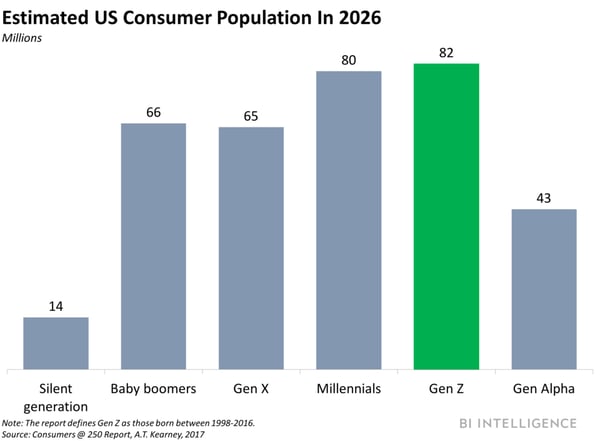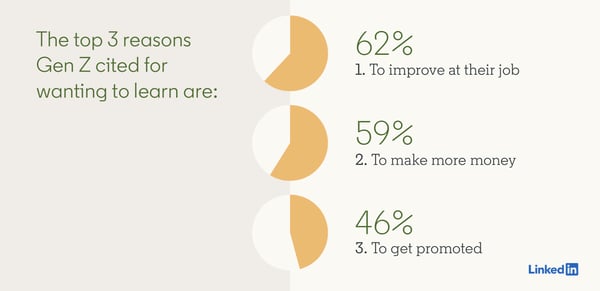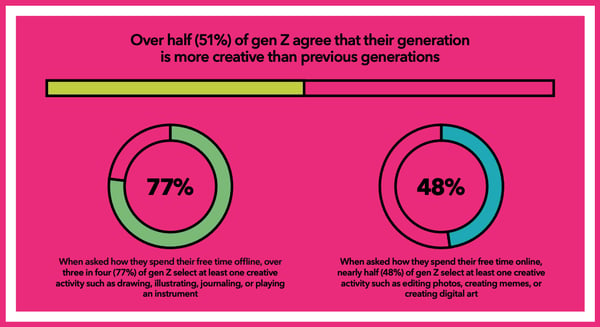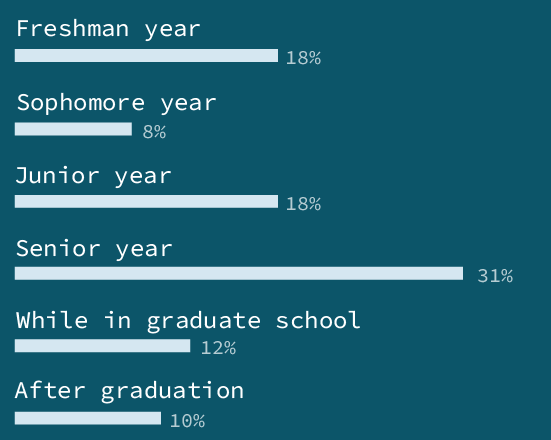It's hard to believe Gen Z is already old enough to start working.
It seems like just yesterday that business experts were writing about how my own generation -- millennials -- was about to completely upend the workforce.
As I've watched journalists, researchers, and general social media users write about millennials and now Gen Z, I've found that they often say similar things. For example, although researchers have identified that each generation was more tech-savvy and career motivated than the last, we still hear myths saying that both age groups are "entitled and less motivated to earn money.'
At this point, millennials have generally disproved the worst stereotypes related to our (lack of) ambition by becoming more educated than some generations before us, growing more frugal about our finances, and having higher expectations for our customer experiences.
Gen Z is falling within a similar cycle of critique as they prepare to enter the workforce. Just like with millennials, internet chatter argues that they're "spoiled," "dependent on their parents," and "terrible with money."
As a future Gen Z manager or colleague, it's important for you to separate myth from reality.
If you've heard some of the more negative the rumors about Gen Z, you might be worried that their attitudes around work will hinder your company in the future. However, taking the time to research the generation will help you realize that -- like most generational assumptions -- these rumors are mostly sweeping generalizations. In fact, a number of credible sources actually predict that this generation will be more ambitious, well educated, humble, and even more innovative than past age groups.
To help you get an idea of how Gen Z talent could benefit your workplace in the future, here are 30 stats that you can keep in mind as they work their way into the labor force..
Gen Z Population
- In 2019, Gen Z outnumbered millennials, making up 32% of the world's 7.7 billion-person population. (Bloomberg)
- Gen Z is expected to cause an influx of roughly 60 million job seekers in the next decade. (CSP.edu)
- By 2026, it's expected that Gen Z will make up 82 million people within the U.S. consumer population. (Business Insider Intelligence)
- Although they're interested in learning hard or technical skills, 37% of Gen Z worries that technology is weakening their interpersonal communication skills (CSP.edu)

Source: Business Insider Intelligence
Skills and Strengths
- Over 76% of Gen Z recognizes that the skills needed in today's workforce differ from the skills needed in previous workforces. (LinkedIn Learning)
- With the evolution of workstyles and emerging technology, 59% of Gen Z professionals think their jobs won't exist in the same way in the future. (LinkedIn Learning)
- When it comes to discovering new skills, 62% of Gen Z will take classes or learn new skills if it makes them better at their job, while 59% will do the same if it will boost their salary. (LinkedIn Learning)

Source: LinkedIn Learning
- Although workplaces are putting more of an emphasis on hiring soft skill talent, 62% of Gen Z feels that hard skills will be more vital to getting a job. (LinkedIn Learning)
- 51% of Gen Z agrees that they're more creative than previous generations. (Snapchat)
- 77% of the generation reports doing creative activities, such as painting when offline. Meanwhile, 48% say they regularly do creative activities, like meme creation, when online. (Snapchat)
- Despite their connection to social media, 51% of Gen Z prefers to communicate with coworkers, friends, and family face-to-face rather than through messaging. (2019 Yellow Recruiting Study)
- Nearly 60% of Gen Z wants to learn a new skill but doesn't have the time. (LinkedIn Learning)

Source: Snapchat
Academic and Career Motivations
- Over 70% of Gen Z professionals say salary is a “top motivator” in their career.. (CSP.edu)
- When it comes to job benefit requirements, 70% of Gen Z calls health insurance a “must-have.” (CSP.edu)
- In 2018, roughly 10% of Gen Z was saving for college. (National Society of High School Scholars)
- 35% of Gen Z students expect at least one job offer by the time they graduate from college. (2019 Yello Recruiting Study)
- About 35% of the age group plans to start saving for retirement in their early 20s. (CSP.edu)
- 59% of Gen Z will learn new skills if they result in higher pay. (LinkedIn)
- Although Gen Z is career-motivated, only 49% counter job offers, while 70% of millennials will negotiate higher salaries. (2019 Yellow Recruiting Study)
- Nearly a quarter of Gen Z college students start their job search before their junior year. (2019 Yello Recruiting Study)

Source: 2019 Yellow Recruiting Study
- Only 38% of Gen Z says work-life balance is an important aspect of a job, while 58% even say they’ll work nights and weekends. (CSP.edu)
Culture and Diversity
- 48% of Gen Z identifies as racially or ethnically diverse. (Pew Research Center)
- When a form requires a person to select a gender, 59% of Gen Z thinks that the form should include an "Other" option. (Pew Research Center)
- Half of Gen Z says society isn't accepting enough to people who don't identify as men or women. (Pew Research Center)
- Despite Gen Z's connection to technology and social media, more people in the age group report feeling lonely than previous generations (Cigna U.S. Loneliness Index)
Relevant Behaviors
- Only 23% of Gen Z expects text messaging to be an essential part of workplace communication. (CSP.edu)
- When it comes to interactions with their bosses, 40% of Gen Z wants daily communication. (CSP.edu)
- Less than 30% of Gen Z will share personal data, such as health, wellness, location, or payment information, online. (Institute of Business Management)
- More than half of Gen Z spends over 10 hours a day on an electronic device. (CSP.edu)
- While 49% say social media is an important part of their lives, 60% still worry it’s too public. (CSP.edu)
Drawing from the Gen Z Talent Pool
While Gen Z is still just stepping into the workforce, this age group's versatility and adaptability might benefit employers in the long run. For example, while they're technically and digitally advanced compared to past generations, they still place importance on critical marketing soft skills such as interpersonal communication and creativity.
Additionally, Gen Z is one of the most diverse generations with a major interest in learning. This not only means that Gen Z will take courses or feedback to better themselves, but they might offer companies a variety of new ideas and insights that could make them more competitive.
If you're a marketing manager of future Gen Z colleagues, you should be ready to embrace their creativity, digital strategies, and youthful input, rather than worrying that the new generation will completely shake up all of the tactics you've created in the past.
To learn more about Gen Z, check out this blog post with a number of other relevant stats. Want to know more about how Gen Z compares to the millennial generation, here's a guide to help you.
No comments:
Post a Comment